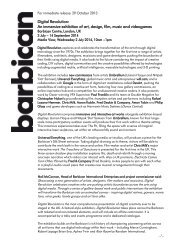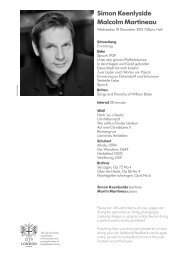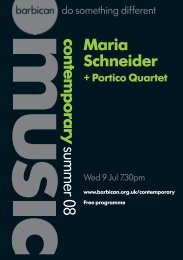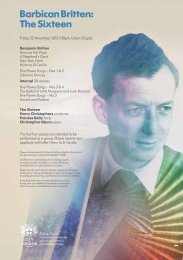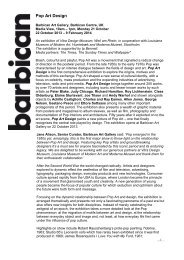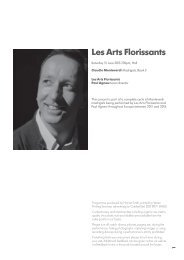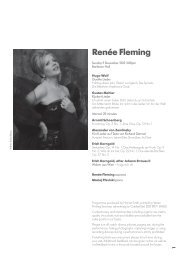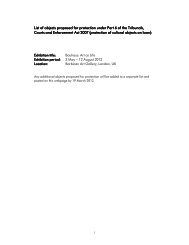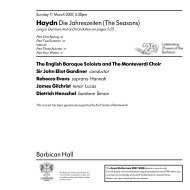Download your concert programme here - Barbican
Download your concert programme here - Barbican
Download your concert programme here - Barbican
You also want an ePaper? Increase the reach of your titles
YUMPU automatically turns print PDFs into web optimized ePapers that Google loves.
Thursday 4 February<br />
That shortcoming had been rectified by the time Berg<br />
composed his Three Orchestral Pieces in 1913–15, a work<br />
that demonstrates his fluency in manipulating a huge<br />
orchestra toward an expressive end. The direct inspiration<br />
seems to have come from the premiere of Mahler’s Ninth<br />
Symphony in June 1912, at which Berg was present. One<br />
might fairly say that he picked up w<strong>here</strong> Mahler left off;<br />
Berg’s Three Orchestral Pieces takes Mahlerian<br />
transformation and exaggeration to an extreme, all overlaid<br />
on a structure of traditional dance-types, such as ländler,<br />
waltz and march.<br />
Everything is meticulously organised in these complex<br />
movements, which are unified by the careful interweaving of<br />
thematic material. The combined duration of the first two<br />
pieces perfectly balances that of the third. In fact, the first two<br />
movements were premiered as a pair, with the March only<br />
joining them in performance seven years later; even the<br />
printed score allows that the first two movements may be<br />
presented without the third.<br />
Berg had hoped to present the set on Schoenberg’s 40th<br />
birthday, which fell on 13 September, 1914. But the work<br />
progressed slowly. ‘I keep asking myself, again and again’,<br />
he wrote to his mentor, ‘whether what I express [in this<br />
piece], often brooding over certain bars for days on end,<br />
is any better than my last things.’ At least the first and<br />
third pieces were ready in time, and Berg offered them to<br />
his teacher along with a letter that speaks volumes about<br />
their relationship:<br />
‘My hope to write something … I could dedicate to you<br />
without incurring <strong>your</strong> displeasure has been repeatedly<br />
disappointed for several years … I cannot tell today whether I<br />
have succeeded or failed. Should the latter be the case, then<br />
in <strong>your</strong> fatherly benevolence, Mr Schoenberg, you must take<br />
the goodwill for the deed.’<br />
Programme note © James M. Keller, New York Philharmonic<br />
Program Annotator<br />
14




